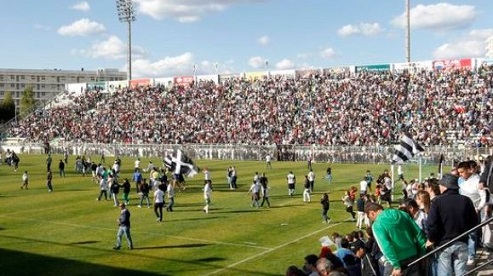 Nobody can doubt how beloved football is in Portugal; millions follow their favourite clubs and the national team, which means that any improvements that can be made in the sport becomes a collective benefit for everyone in the end. In fact, some are starting to engage with AI to transform every aspect of the game.
Nobody can doubt how beloved football is in Portugal; millions follow their favourite clubs and the national team, which means that any improvements that can be made in the sport becomes a collective benefit for everyone in the end. In fact, some are starting to engage with AI to transform every aspect of the game.
The Portuguese Football Federation (FPF) in particular have partnered with Pixellot, using its solution suite to create an over-the-top application, generate videos, and offer tactical analysis, all in the hopes of improving player performance and overall strategy so that fans stay engaged.
Technology has already been enhancing football
For as much as we love the game, many of us don’t think much of the football itself, the very thing that the entire game is built upon. The fact is that there’s more to the modern ball than layers of polyurethane; quite a bit of technology goes into the design, with the most significant feature being Qatar 2022’s ball - the first “connected ball” to be used in a FIFA World Cup.
Al Rihla was not the first to use a ball with sensors, but it nevertheless was a revolutionary choice to include the tech in a World Cup championship. This ball used a suspension system that can send data at a rate of 500 times per second, offering unprecedented real-time insight into the way the ball moved on the field.
Not everyone is happy with the inclusion, though, and feel that it’s impacting the game. Cristiano Ronaldo in particular, voiced discontent, claiming that the football failed to register one of his touches in the Portugal-Uruguay game and giving teammate Bruno Fernandes the credit instead. Though this may not present a particularly significant dispute, it’s still a key example of the practical use of the technology.
Similarly, the most recent World Cup featured a video assistant referee program, which played a part in making final decisions for some plays - a slightly more controversial inclusion.
FPF’s dive into AI integration
Not wanting to fall behind in the innovation, FPF has taken strides to stay forward-thinking by outlining an ambitious Project 2030 plan, emphasising improvements in four major areas:
- Promoting Women’s Football - More than increasing fan participation, FPF wants to create new coverage and opportunities for girls and women in Portugal who want to play football, at every level from the grassroots to the top elite. Part of the project includes creating and improving infrastructure and governance for this dimension of the sport.
- Developing Youth Talent - Likewise, the FPF wants to create more opportunities for Portuguese youth who want to play football professionally, developing talent from U15 to U23 in the hopes that rising stars will move on to the big leagues.
- Enhancing Performance Analysis - Gathering data and using technology can give FPF an extra competitive advantage, which is crucial to have in modern football. The federation has already had a taste of these much-needed improvements since it installed new tech at its Lisbon national training centre, and there’s no doubt that it will keep making these improvements.
- Increasing Fan Engagement - By creating new and improved content in these realms, FPF aims to gain more engaged fans throughout the country and the world, connecting them through Portuguese football culture.
CTO Hugo Freitas sang Pixellot’s praises, believing that the partnership would shake up league coverage and use AI to deliver a lavish, data-rich experience for fans, coaches, and players.
It’s not the first such venture for a football league to engage with AI. Germany’s Bundesliga pioneered new standards by leveraging its data so that it could create personalised content whilst enhancing efficiency behind the scenes. In the case of the Bundesliga, this integration led to a 17% increase in time spent on the official app - precisely the sort of thing the FPF wants to emulate for itself.
AI is also revolutionising the way player performance is analysed. Advanced data like “win probability” and “expected goals” could even upheave expectations those who wager on international betting sites have, who might see sportsbook odds shifting over time. These analytics use incredible swaths of datasets, including shot angle and distance, the current scoreline, and any other number of metrics to discover insights that the human eye might always miss.
The future for Liga Portugal
It’s safe to say that football stands on the cusp of a new era. It’s the world’s most popular sport, and the FPF has the opportunity to get in on the ground floor by integrating AI in the right ways - machine learning, player analysis, natural language processing, and fan personalisation are merely the tip of a deep iceberg.
However fans may feel about potential changes ahead, these technologies will continue to grow in concert and process data together, and we’re bound to see more leagues around the world incorporating them. Really, the sky is the limit for the FPF and Liga Portugal, and time will tell how well they’ll do it.
Of course, a measured approach is ideal in order to realise all the ethical and practical benefits lest everything become too reliant on algorithms or allow us to compromise our sports values. Competitive pressures will undoubtedly create even more innovation, but cooperation will be required. Profound changes are to be expected, but approaching this evolution as a united family will help keep the core essence of football fully intact along the way.

